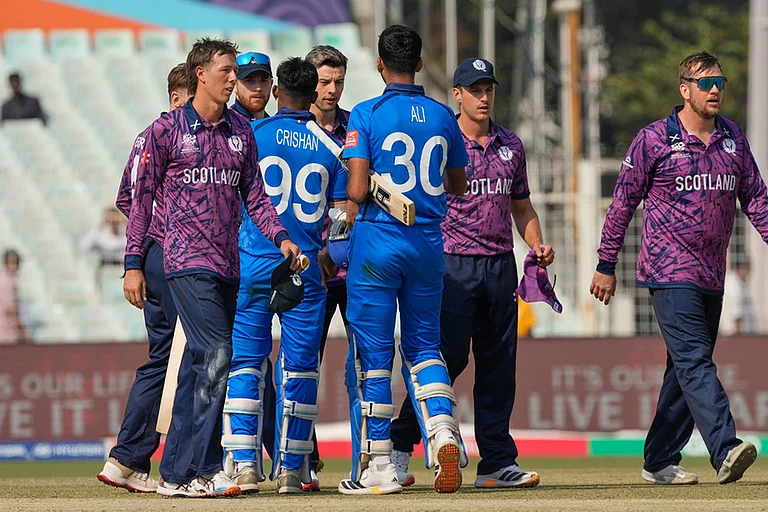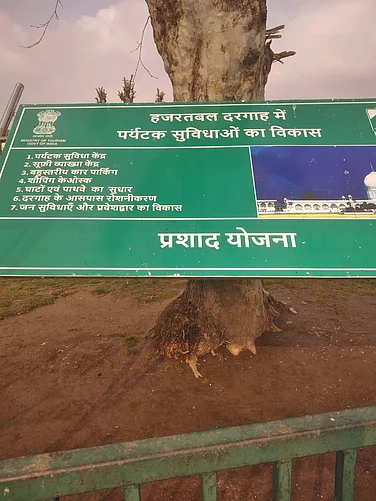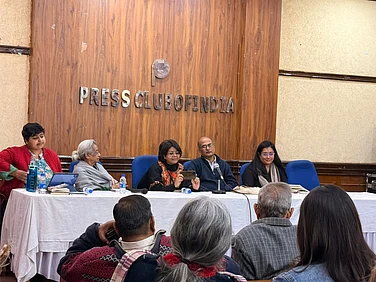
My view of India was formed by two distinct yet related forms of British sentimentality. The first was the one that came from my paternal grandfather, who had been a footsoldier in India during the First World War. The old man must have been one of the most insular Brits ever born, and I don't think that he ever ventured overseas again, but something about India had penetrated his stern Anglo-Saxon Calvinist soul, and the 'bungalow'—one of the many words we owe to this connection—that he built for his retirement was named 'Coonoor', after a rest-station in southern India used by British soldiers. Coonoor, the place, was no Simla or Ootacamund, and Coonoor the bungalow was not hung with tigerskins or pig-sticking implements either. But there was a lot of Benares brass, and a book about the 'Mutiny' of 1857: the sort of display that one of Kipling's returned rankers might have mounted.
My father was a Royal Navy man and I was brought up largely on navy bases, and sent to a boy's boarding school that was attended mainly by the sons of officers. The school library was full of books devoted to the romance of colonialism, and I loved to steep myself in the work of G.A. Henty and, as time went on, John Masters and Rudyard Kipling. Maharajahs, elephants, dusty plains, imposing mountains, teeming bazaars...and loyal Indian jemadars and subedars who made sturdy and trusty subordinates. The history lessons more or less repeated these tropes: we had to know about the Battle of Plassey, the Siege of Lucknow and the Black Hole of Calcutta, though if you paid attention and did a little extra reading you might discover, from Edmund Burke's impeachment of Warren Hastings, that not everything had been part of a civilising mission.
India had become independent less than two years before I was born. This fact was not yet officially in the history books and meanwhile, as Britain gradually contracted its overseas presence, falling back from Malaysia through Aden in the 1950s and 1960s, the whole subject was still a fraught one. In my family circle, it was generally assumed that India had been better governed by the Raj, and that nostalgia for British rule was widespread, and there was the occasional stab of conscience about the "scuttle" of 1947. (My father had briefly served on a warship with Earl Mountbatten and formed a low opinion of him.)
I came to take the anti-colonialist side in every argument about Cyprus, Aden, "Rhodesia", and Ireland, and made something of a study of the subject. This brought me into contact with that other British-Indian tradition—the Fabian and socialist friendship with the long struggle for Indian emancipation. As the youngest member of the committee of the Movement for Colonial Freedom, I shook hands with its oldest member, Fenner Brockway, who had been a champion of Indian rights in the House of Commons long before I was born. I read the correspondence between Edward Thompson and Rabindranath Tagore, which was evidence of a great literary and personal friendship. I went to Balliol College, Oxford, which had always had numerous Indian students, including the veteran Communist, R. Palme Dutt. I began to write for the New Statesman—which I am sure some older readers of this magazine will remember—and when I joined its staff was impressed by how many subscribers we still had in India, and by how many of our readers' letters came from there. (When I made my first visit to India, in 1979, I was equally touched by the way so many people would agree to be interviewed on the basis of this single ancestral connection.)
But by 1979, the old solidarity had frayed a bit.The proclamation of a state of Emergency by Indira Gandhi had been foreshadowed by her use of emergency powers against the railwaymen's union: an action which was covered in rather gloating terms in the New Statesman, by a reporter named Sarwar Lateef.When the full Emergency was imposed, many of the traditional British Labour friends of India—most notably Michael Foot and Jennie Lee—were ready to support it. So were old comrades of theirs in Delhi, such as the celebrated cartoonist Abu Abraham. It seemed to me that it was one thing to hail Mrs Gandhi's ruthlessness in the matter of Bangladesh in 1971, and quite another to endorse her suspension of the Constitution and her indulgence of dynastic whims on the part of her offspring. I wrote a couple of items for the magazine, focusing particularly on the imprisonment of George Fernandes, which led to quite a row within the cohort of the British pro-Congress loyalist Left. Surely the whole point of India's independence was that it had resisted all temptations to subside into post-colonial autocracy? Now we were hearing the traditional banana-republic excuses about "order" and "security" being more important than mere liberties. It was a great relief to me when the historian E.P. Thompson, son of Edward and a moral hero on the British Left, wrote an essay excoriating Indira Gandhi's arrogance and corruption. It was an even greater relief when the Indian voters took the same view a few months later.
Thus, by the time I first set foot in India, I was in a very small way the heir to two vanished or discredited mentalities: the Raj nostalgia one and the Nehru-socialist and "non-aligned" one. I covered the election that brought Mrs Gandhi back to power just after the Soviet invasion of Afghanistan, and witnessed the ridiculous confusion of the Indian 'Left'. Impressive as it was to see Jyoti Basu address huge, thoughtful crowds in Calcutta with a long and serious speech, I felt as if I was watching a wave of the past rather than the future. And I noticed that if an outside visitor, even a sympathetic one, had any criticisms, then he was always likely to be told that no further advice was required from British persons. This struck me as a symptom of insecurity, even immaturity, rather than of confidence. From the other side, so to speak, I produced two documentaries and a book, ridiculing those like the supporters of 'Bhagwan Rajneesh' in Pune, and 'Mother Teresa' of Calcutta, who regarded India as a playground for experiments or as an object of charity and condescension.
For all that, I have to say that I truly loved India from the very first moment, and have adored every other moment of my three much-too-brief visits. And without, I hope, lapsing into my own version of sentimentality, I almost always cheer up when I meet an Indian in another country. The odds seem always in favour of a rapport. Where does it come from, this latent bond? It must have something to do with the language. When I was doing some research for my little book on George Orwell, for his centennial in 2003, I came across some of his correspondence with the late Mulk Raj Anand: a man I shall always be sorry I never met. Orwell encouraged Anand to resist the taunts about his "babu" character, to continue writing in English, and to believe that one day English would be one of India's accepted languages. It pleased me tremendously when Salman Rushdie's anthology of Indian writing in English came out a few years ago, with a contribution from Mulk Raj Anand as the oldest contributor and an essay by Salman saying that, if English had once been thought of as a "colonial" language, or the language of the conqueror, then so for that matter had Urdu (his own first language) once been regarded in the same manner.Apart from its aptness in one direction—no literate English person can now overlook the Indo-Anglian branch of literature, from R.K.Narayan to Arundhati Roy—this seemed to constitute a blow at that very Indian self-pity that had always been such an obstacle to clarity.I am writing these words in Stanford, a small university town halfway between San Jose and San Francisco, California, where the Indian presence has become an admired and accepted part of American life, not just because of the marked contribution of Indians to the 'Silicon Valley' but because of the role played by Indians in every aspect of the culture. There is not, yet, the conquest of California by Indian cuisine, of the sort that has transformed British eating habits, but on good days I can feel it coming and on most days I can find myself a decent vindaloo.

For all this progress from colonial to post-colonial through the other, later evolutions of India's consciousness, a friend of the country is still bound to notice the legacy of under-development that keeps India a little below its real moral and political weight. The partition of the subcontinent, which is the 'root cause' of this disorder, is often discussed as if it occurred last week. That doesn't surprise me: the same mentality can be found in Cyprus and in Ireland and in Palestine. It may embarrass and even annoy younger Indians, who wish they could escape from its burdensome legacy, but there is no way of abolishing its influence. I remember making the land-crossing, on the old Grand Trunk Road between Amritsar and Lahore, on the 50th anniversary of the event and being horribly impressed by a Punjabi landscape frozen in time.
Surely it must be possible for the next generation of Indians to stress what is positive about this grim inheritance? It has been demonstrated in practice, by the repeated partition and re-partition of Punjab and Bengal, that religion cannot define a nationality. (The awful stasis in Kashmir illustrates the same point in a different way.) Meanwhile, and despite many backslidings, India has shown that multi-confessional and multi-communal democracy is still workable in practice. For this reason, it is detested by those who adhere to the ideology of the one party or the one god. These diverse points all converge at something like a crossroads which we are all about to reach. To get over their fixation on the British was for some Indians the work of a generation. To wean itself from the addiction to "socialist planning" a la Russia took India itself almost as long. To replace this with an attachment to Hindu and ancestral pride—as Sir Vidia Naipaul sometimes seems to recommend—would be to miss the point of the historical and geographical crux that India now commands. I have come to hope very devoutly that India ceases to think of itself as a 'Third World' nation, and that it makes a strength of its former weaknesses. In practice, this ought to mean an across-the-board alliance with the United States, which for years allowed the Cold War to obscure its former support—especially under Franklin Roosevelt—for India's unqualified independence. There now exist the necessary constituents—a common commitment to pluralism, a shared legacy of English, a mutual interest in defeating religious and political totalitarianism, a bilateral investment in the new economy of innovation—to make the material facts into political ones. Some American isolationists resent the 'outsourcing' of businesses that they thought they could monopolise, and some Indian chauvinists suspect the gross materialism of America, and common rivals or enemies are of course insufficient cement for a true friendship, but I believe one can glimpse a truly equal and fertile relationship ahead, of the sort which my ancestors desired but could never, because of the original inequality, achieve.
What I think this ought to mean in practice is a more full-hearted repudiation, by India and Indians, of the resentful and discredited 'Third Worldism' that has led, in the recent past, to indulgence of Arafatistism and Baathism and even bin Ladenism, and to excuses made for all of these phenomena even by younger Indian intellectuals.I think that the United States ought long ago to have supported Indian membership on the Security Council of the United Nations. But India, too, must come off the fence. Very helpful as Indian policy in Afghanistan has been, for example, it is still too obviously conditioned by "balance-of-power" considerations vis-a-vis Pakistan and Kashmir. The critical thing is for India, and indeed many Indians, to cease watching events in Iraq and North Korea as if they were evaluating the progress, or lack of it, as spectators or non-combatants. A victory for the jehadists in Iraq, for example, would not be a defeat just for the Bush administration, as many people long habituated to 'neutralism' seem to allow themselves to imagine or (even, at their worst) to hope. The full emancipation from dependence and post-colonialism will occur when India accepts responsibility, becomes truly internationalist outside its own periphery, and uses the word 'global' to describe more than the prosperity of Bangalore. It is time to take up the Indian man's burden, and the Indian woman's burden too, and make a common stand against the barbarism that threatens us both.
(Christopher Hitchens, author most recently of Thomas Jefferson: Author of America, is a columnist for Vanity Fair magazine)


























